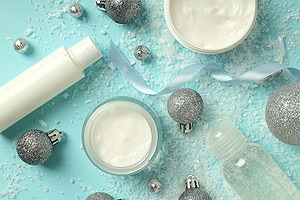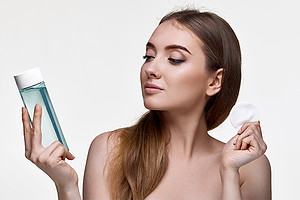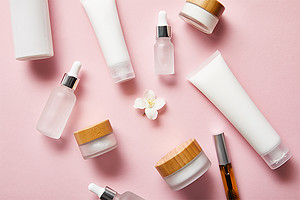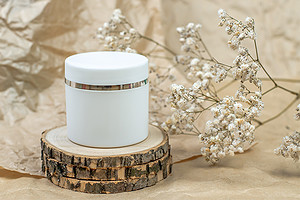Toners are probably considered the most confusing skincare and beauty products. But, the answer to the question, ”Are toners good for sensitive skin?” Yes, toners are suitable for sensitive skin to soothe, calm, hydrate, and rule out sensitive skin issues. (1)

Around 40% of men and 50% of women consider themselves to have sensitive skin and describe their skin to be itchy, dry, uncomfortable, highly reactive, and red due to environmental factors (wind, temperature, and UV radiation), cosmetic products, topical medicines, stress, pollution, and hormones. (2)
Alcohol-free toner with natural ingredients (like witch hazel, aloe vera, glycerin, and more) gently rebalances your sensitive skin to give that latent glow.
Read below to find out the purpose of toner for your skin and how to choose the right one.
Article Contents
How Do Toners Help Sensitive Skin?
Toners come in multiple formulations to help sensitive skin.
1. Toners have humectant properties
Hydrating toners with humectant properties are used to refresh and improve skin hydration. Toners include glycerin or hyaluronic acid to eliminate tight sensations (3) to fight itchiness and dryness associated with sensitive skin. (4)
2. Toners rejuvenate dry skin
Sensitive skin is primarily associated with dry skin, and a topically herbal toner gel can rejuvenate and improve the health of pale and dry skin. Herbal gel toner can calm, smoothen, and be an astringent to rejuvenate skin. (1)
3. Toners reduce irritation
Safe herbal skin toners with soothing, calming, and astringent properties can reduce face and skin irritation and enhance the beauty of the same in today’s busy schedule. (1) Thus, it is suitable for sensitive skin.
4. Toners can exfoliate the skin
A few toners contain two main classes of hydroxy acids, AHAs (alpha hydroxy acid) and BHAs (beta hydroxy acid). (5)
AHAs can treat skin conditions like a scar, skin dryness, acne, pigmentation, and wrinkles and stimulate epidermal cell exfoliation for smoother, softer skin with lightened age spots, faded wrinkles, and decreased blemishes. BHAs, like salicylic acid, are similar to AHAs but different in solubility. BHAs found in skin care products function best. (5)
When you use acid-based toners with low concentrations, it works on your sensitive skin effectively. Avoid toners with high concentrations, especially AHAs, if your skin is sensitive to prevent irritation.
5. Toner balances the pH level of sensitive skin
Toner balances the skin’s optimal pH level, so choose a toner with a pH value of 4 to 7, as elderly skin is more dry, prone to cracking, and recovers slowly from alkalinity damage. (6)
Cosmetic products in the pH range of 4.5 to 6.5 (normal skin pH range) are considered safe. Maintaining cutaneous pH (5.5 on the surface) keeps the whole barrier and sufficient skin hydration. (7) Therefore, a 5.5 pH toner might suit sensitive skin.
How to Find the Good Toner for Your Sensitive Skin?
A toner for sensitive skin must be free from alcohol to avoid irritation or trouble spots aggravation. It must have hydrating and soothing ingredients to your skin to make it look clearer and fresher.
1. Pick an alcohol-free toner
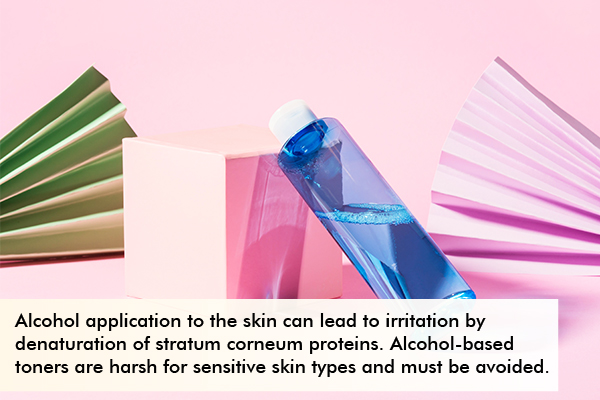
Alcohol application to the skin can lead to irritation and damage by denaturation of stratum corneum proteins. (8)
Alcohol also triggers whiteheads and blackheads by dilating skin pores, and its improper treatment can cause acne and skin inflammation. (9) Simple alcohols like –
- Ethanol is associated with contact dermatitis or skin irritation. (10)
- Methanol is highly poisonous, and its skin exposure can lead to severe systemic toxicity or death. (11) Alcohol-based toners are harsh for sensitive skin types and must be avoided.
2. Pick a soothing toner rich with allantoin
Allantoin comes from the root of the comfrey plant and is excellent for sensitive skin due to its soothing and moisturizing properties.
It accelerates the expansion of epithelial cells for skin recovery, for skin to retain more water, and to reconstruct a protective hydro-lipid coat. It is not allergenic and does not cause skin irritation.
Allantoin is the best ingredient in pharmacies and cosmetics for allergies, acne, or dry skin. It promotes cell regeneration and is a non-irritant that soothes, protects, and softens.
Also, avoid artificial colors, perfumes, dyes, harsh chemicals, and parabens that may aggravate your skin.
3. Acne-prone/sensitive-oily skin
People with oily skin should use toners containing exfoliating ingredients like witch hazel and salicylic acid to eliminate excess oil without inflaming sensitive skin.
Witch hazel (Hamamelis virginiana L.) is a plant used to treat inflammatory skin disorders. (12) It is a primary toner ingredient, natural astringent, and botanical anti-inflammatory to remove excess skin oil.
Salicylic acid is excellent for acne-prone, oily skin as it penetrates the pores and dissolves excess debris and sebum. Neutralized salicylic acid at a 1% concentration is a suitable exfoliant for sensitive skin. (13)
4. Sensitive-dry skin
People with dry, sensitive skin should opt for alcohol-free toners containing hydrating ingredients, like hyaluronic acid and glycerin. Green tea, an anti-inflammatory ingredient, soothes dry, sensitive skin.
Both hyaluronic acid and glycerin are potent humectant moisturizing agents. (14)
Hyaluronic acid is a unique active moisturizing ingredient to hydrate dry, sensitive skin (15) and can hold water. (16) Glycerin is an emollient and humectant that can normalize skin hydration and moisturize dry skin, transferring water from the trans epidermal to the skin surface. (14)(17)
Natural Toners for Sensitive Skin
For wanting control over the ingredients used in toner, try making a homemade toner.
1. Aloe vera and cucumber serum for hydrated skin
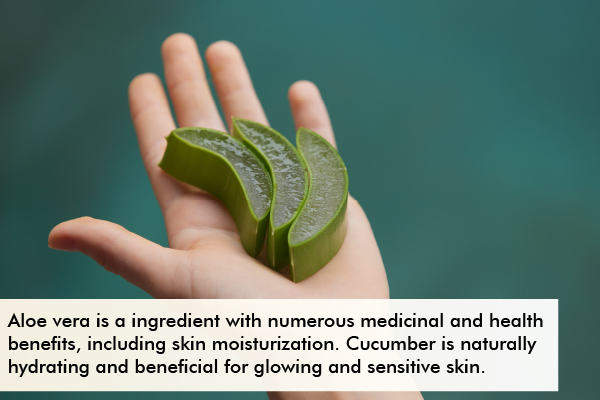
Aloe vera is a marvel ingredient with numerous medicinal and health benefits, including skin moisturization. (18) Aloe vera inhibits inflammation and heals wounds faster.
The cucumber (from the family Cucurbitaceous) is found throughout India in every household for its high-water content property and its ability to boost skin health and complexion. Cucumber is naturally hydrating and beneficial for glowing and sensitive skin. (1)
How to make:
- Grate 1 cucumber and extract the juice to a bowl.
- Add 3–4 tbsp of aloe vera gel.
- Mix until a little runny consistency is attained.
- Move this mixture into a spray bottle. Your toner is ready to use.
2. Green tea toner for your sensitive skin
Lipids in green tea reduce inflammation. (19) Acne-prone skin is sensitive, and green tea can treat it due to its antioxidant and anti-inflammatory properties. (20)
Green tea also has the potential to alleviate sebum production. (20)
How to make:
- Boil 1 cup (120 ml) of water in a pan.
- Add 1 tsp of green tea leaves. You can dip one green tea bag. Let it brew.
- Let the mixture cool down and transfer it into a glass bottle. Keep the bottle in the refrigerator.
- You can use this for seven to eight days.
What Is the Purpose of a Skin Toner?
Skin toners have varied purposes, like –
- Eliminating traces of dirt, makeup, or oil
- Cleaning your pores thoroughly and closing it
- Restoring the natural pH balance of the skin
- Betterment of the skin to absorb moisturizers. (1)
Direction to Use Gel Toner at Home for Sensitive Skin
Following are the directions to use a toner at home for sensitive skin.
- Cleanse your face gently and thoroughly to remove oil, makeup, and dirt traces.
- Take a few drops of toner on a cotton pad. (You can also use your hands in place of cotton pads)
- Apply it on your face and neck thoroughly and let it dry.
- Apply a moisturizer or a serum afterward. (1)
General Queries
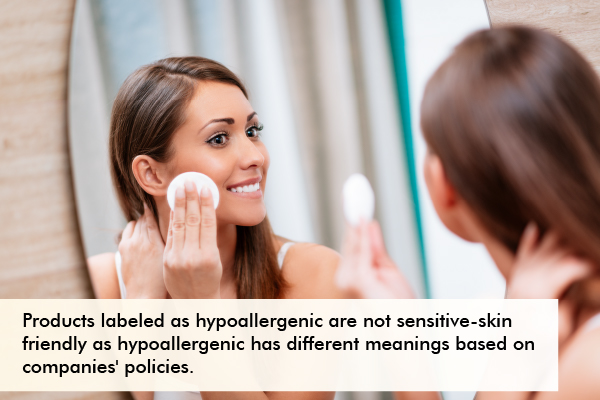
Are products labeled hypoallergenic, sensitive-skin friendly?
No, products labeled as hypoallergenic are not sensitive-skin friendly as hypoallergenic has different meanings based on companies’ policies. Hypoallergenic skincare products have little to no allergic reaction, but this doesn’t make them safe. Therefore, a patch test is always advised before using any product.
Cosmetic manufacturers claim that hypoallergenic products have fewer allergic reactions than other products. So, people having normal or hypersensitive skin may be influenced into believing the gentleness of these products on the skin more than non-hypoallergenic cosmetics.
Is sensitive skin inherited?
Allergic disorders like atopic dermatitis, skin conditions, and diseases like rosacea, acne, eczema, and psoriasis run in families and are often hereditary.
However, sensitivity triggered due to cosmetics, skincare, or household ingredients is not inherited. Other factors that lead to skin sensitivity are aging, puberty, or hormonal changes.
Final Word
Toner is a worthwhile product for people with sensitive skin and oily, dry, or acne-prone skin. It eliminates possible irritants from the skin to keep it healthy and hydrated.
A toner must have anti-microbial, hydrating, and anti-inflammatory properties for sensitive skin. On the contrary, avoid synthetic fragrances and alcohol-containing products that may irritate.
Use in moderation, and if signs of irritation persist, discontinue immediately. Go for natural homemade toner instead for your sensitive skin.
References
- Formulation and physical characterization of herbal face Gel Toner. https://www.researchgate.net/publication/353584527/.
- Rodan K, Fields K, Majewski G, Falla T. Skincare bootcamp: The evolving role of Skincare. Plastic and reconstructive surgery. Global open. https://www.ncbi.nlm.nih.gov/pmc/articles/PMC5172479/. Published December 14, 2016.
- Protecting and resolving facial skin from UV rays and air pollution. https://www.researchgate.net/publication/355263699/.
- A; IACP. Sensitive skin: An overview. Indian journal of dermatology, venereology and leprology. https://pubmed.ncbi.nlm.nih.gov/23254724/.
- Moghimipour E. Hydroxy acids, the most widely used anti-aging agents. Jundishapur journal of natural pharmaceutical products. https://www.ncbi.nlm.nih.gov/pmc/articles/PMC3941867/. Published 2012.
- Kuo S-H, Shen C-J, Shen C-F, Cheng C-M. Role of ph value in clinically relevant diagnosis. Diagnostics (Basel, Switzerland). https://www.ncbi.nlm.nih.gov/pmc/articles/PMC7167948/. Published February 16, 2020.
- Duarte I, Silveira JEPS, Hafner Mde FS, Toyota R, Pedroso DMM. Sensitive skin: Review of an ascending concept. Anais brasileiros de dermatologia. https://www.ncbi.nlm.nih.gov/pmc/articles/PMC5595600/. Published 2017.
- (PDF) hand sanitizers: Is over usage harmful – researchgate. https://www.researchgate.net/publication/344734032/.
- (PDF) Alcohol and your skin – researchgate.net. https://www.researchgate.net/publication/349428090/.
- Lachenmeier DW. Safety evaluation of topical applications of ethanol on the skin and inside the oral cavity. Journal of occupational medicine and toxicology (London, England). https://www.ncbi.nlm.nih.gov/pmc/articles/PMC2596158/. Published November 13, 2008.
- Chan APL, Chan TYK. Methanol as an unlisted ingredient in supposedly alcohol-based hand rub can pose serious health risk. International journal of environmental research and public health. https://www.ncbi.nlm.nih.gov/pmc/articles/PMC6069146/. Published July 9, 2018.
- Piazza S; Martinelli G; Vrhovsek U; Masuero D; Fumagalli M; Magnavacca A; Pozzoli C; Canilli L; Terno M; Angarano M; Dell’Agli M; Sangiovanni E; Anti-inflammatory and anti-acne effects of Hamamelis virginiana bark in human keratinocytes. Antioxidants (Basel, Switzerland). https://pubmed.ncbi.nlm.nih.gov/35740016/.
- Exfoliation for sensitive skin with neutralized salicylic acid? https://www.researchgate.net/publication/229948595/.
- Milani M, Sparavigna A. The 24-hour skin hydration and barrier function effects of a hyaluronic 1%, glycerin 5%, and centella asiatica stem cells extract moisturizing fluid: An intra-subject, randomized, assessor-blinded study. Clinical, cosmetic and investigational dermatology. https://www.ncbi.nlm.nih.gov/pmc/articles/PMC5560567/. Published August 11, 2017.
- Juncan AM, Moisă DG, Santini A, et al. Advantages of hyaluronic acid and its combination with other bioactive ingredients in cosmeceuticals. Molecules (Basel, Switzerland). https://www.ncbi.nlm.nih.gov/pmc/articles/PMC8347214/. Published July 22, 2021.
- Papakonstantinou E, Roth M, Karakiulakis G. Hyaluronic acid: A key molecule in skin aging. Dermato-endocrinology. https://www.ncbi.nlm.nih.gov/pmc/articles/PMC3583886/. Published July 1, 2012.
- Spada F, Lui AH, Barnes TM. Use of formulations for sensitive skin improves the visible signs of aging, including wrinkle size and elasticity. Clinical, cosmetic and investigational dermatology. https://www.ncbi.nlm.nih.gov/pmc/articles/PMC6559254/. Published June 6, 2019.
- Razia S, Park H, Shin E, Shim K-S, Cho E, Kim S-Y. Effects of aloe vera flower extract and its active constituent isoorientin on skin moisturization via regulating involucrin expression: In vitro and molecular docking studies. Molecules (Basel, Switzerland). https://www.ncbi.nlm.nih.gov/pmc/articles/PMC8125160/. Published April 30, 2021.
- Mahmood T, Akhtar N, Khan BA, Khan HMS, Saeed T. Outcomes of 3% green tea emulsion on skin sebum production in male volunteers. Bosnian journal of basic medical sciences. https://www.ncbi.nlm.nih.gov/pmc/articles/PMC5504505/. Published August 2010.
- Kim S; Park TH; Kim WI; Park S; Kim JH; Cho MK; The effects of green tea on acne vulgaris: A systematic review and meta-analysis of randomized clinical trials. Phytotherapy research: PTR. https://pubmed.ncbi.nlm.nih.gov/32812270/.


